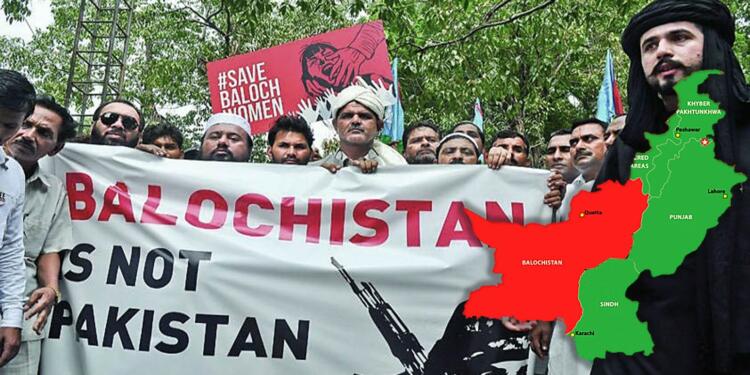Since the nation called Pakistan was formed, it has faced regional unrest across its territory. The recurring phenomenon resulted in the formation of Bangladesh during 1971. Now, Balochistan, the largest state, seems to be on the same path. And the biggest problem is that, Pakistan’s territorial integrity is suffering at the hands of its divisive politics.
Has Balochistan Liberation Movement reached climax after military atrocities?
On December 25, Hindustan Times reported that Balochistan saw two separate attacks on Police installations. Six police personnel were reported to be injured in the grenade attacks. Few hours earlier, one officer and four soldiers of the Pakistan armed forces were killed in an IED blast. Obviously, this is not the first time these types of incidents have surfaced. There have been many previous incidents of such attacks and clashes in Balochistan. The reasons for it can be traced back to the tumultuous way in which Balochistan was included in Pakistan.
Balochistan was forcefully acceded to Pakistan. The native Balochs of Kalat region never really wanted to be a part of Pakistan. But since Balochistan was officially part of the country, it was the duty of the government to provide basic rights and facilities to its citizens. Instead, Balochistan was exploited and subjugated. The Pakistani government embraced an authoritarian attitude to deal with the issue. This led to malpractices like human rights violations, target killing and enforced disappearances.
Baloch leader Brahumdagh Bugti, on “International Day against enforced disappearances,” stated that political activists and journalists have been abducted by Pakistani secret agencies like ISI. As per the reports. Pakistan army illegally detained 19,000 people including women and children. Many of the women detained were raped and killed. Famous International Politics lecturer, Richard Jackson, in his book ‘Terrorism: A Critical Introduction’ wrote that 1,102 people disappeared from the Balochistan in 2008 alone.
Pakistan is the cause of Balochistan unrest
Pakistan has always treated the people of Baloch origin as secondary citizens. The only reason Pakistan wanted Balochistan to be its territory was because of its richness in natural resources like copper, oil, gas, gold, etc. In addition to that, the region expands to Arabian Sea, a prominent route for sea trade.
According to UNDP report, Balochistan has the second highest per capita headcount (71.2 per cent) for multi- dimensional poverty in Pakistan. The problem is constantly worsened by weak institutions, weak governance and poor law enforcement. Resultantly, anti-Pakistan terror groups have occupied the vacant seat left by the Pakistani state machinery.
Balochistan Liberation Army, Balochistan Liberation United Front and Lashker-e-Balochistan are some of the groups that have waged an arm struggle against Pakistani subjugation. Balochistan has fought 5 insurgencies against Pakistani oppression.
The ‘CPEC’ is another cause of conflict between Pakistan and Balochistan. Balochistan sees CPEC as the threat to its territorial integrity along with an attempt to exploit Baloch resources including the Gwadar port. This has led to many violent incidents. Earlier this year, a Baloch militant, opposed to CPEC, carried out a suicide attack that killed several Chinese citizens.
Previously, similar attack led to 13 deaths with 9 being Chinese citizens. Since the announcement of CPEC, Balochistan liberation activists have attacked Chinese citizens and infrastructure time and again. In November 2018, BLA targeted the Chinese consulate in Karachi. In 2019, Zaver Pearl-Continental Hotel, a five-star facility was attacked. BLA claimed responsibility of that attack.
Also Read: When America urged China to attack India during the 1971 war
Pakistan’s further bifurcation is Inevitable
The situation in Balochistan is similar to former East Pakistan. East Pakistan fought to gain freedom and became Bangladesh in 1971. The prime cause of that bifurcation was treating the residents of East Pakistan as second-class citizens. Even the basic amenities like health and education were not provided to them.
The political subjugation of the region is evident by the fact that, after getting majority seats in the general election, Sheikh Mujibur Rehman was barred from forming a government. It all happened because he was considered inferior. The political leadership of Pakistan was too egoistic to be governed by an East Pakistani leader.
Learning from past mistakes is the golden rule to turn down adversity. But, the problem with Pakistan is that, they don’t want to learn. Within just 25 years of its formation, Pakistan lost a large portion of its territory and that too because of its oppressive attitude towards its people. So, with this political and social egoism, sooner or later, Balochistan’s identity as a sovereign nation is inevitable.
Support TFI:
Support us to strengthen the ‘Right’ ideology of cultural nationalism by purchasing the best quality garments from TFI-STORE.COM

























